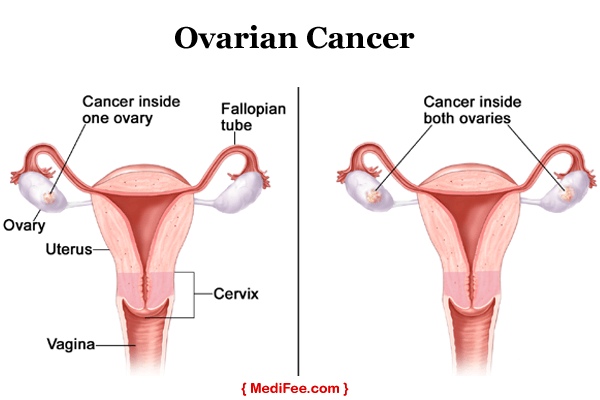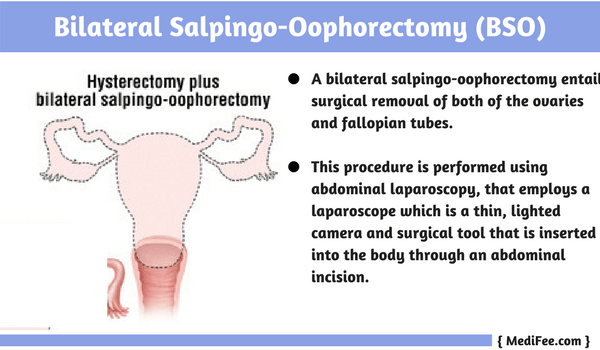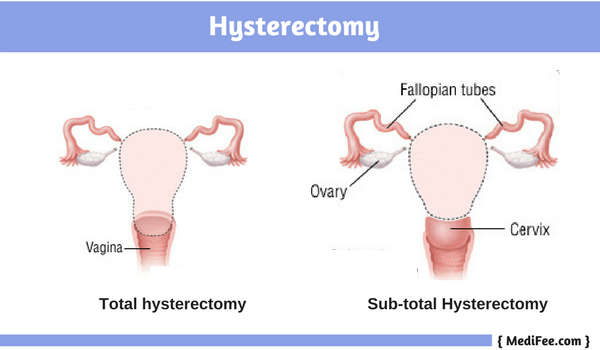Ovarian Cancer Surgery
Listed below is the step by step procedure of ovarian cancer surgery:
- What is Ovarian Cancer Surgery?
- Why is Ovarian Cancer Surgery Required?
- Pre-operative Preparation
- Day Before Surgery
- Procedure Day
- Methods/Techniques of Ovarian Cancer Surgery
- Post Procedure
- Risks and Complications
What is Ovarian Cancer Surgery?
Ovaries are an integral part of the female reproductive system and produce estrogen and progesterone. These are the hormones responsible for controlling the development of all female characteristics at puberty. They are oval-shaped organs situated on either sides of uterus. Various diseases can affect ovaries and ovarian cancer is one of them.
Ovarian cancer can be a primary disorder or due to spread of cancer from another cancerous organ. Ovarian cancer surgery is the main treatment method adopted in case of ovarian cancer. The amount of surgery that may be required will be dependent on how much the cancer has spread. Expert gynecologic oncologist are recommended for this surgery as if cancer is wrongly staged, chances are high that surgery may be needed again.
Why is Ovarian Cancer Surgery Required?
Treatment for ovarian cancer includes chemotherapy, surgery and sometimes radiation. Almost every women who suffers from ovarian cancer will need surgery along with chemotherapy. Some primary reasons why surgery is necessitated include:
- Early diagnosis:
Imaging tests aren't always enough to observe the extent of spread of ovarian cancer. At such times, surgery is useful in establishing the exact stage of cancer and also whether the ovarian cancer has spread to some other organ. - Eliminating cancerous tumors:
The surgery can help the surgeon in removing as many traces of cancer from ovaries as possible if required.
Pre-operative Preparation
Before the ovarian cancer surgery, there are different tests like blood tests, biopsy, electrocardiogram, chest X-ray and urine tests ordered by the surgeon. These tests are all part of the preoperative preparation patient has to do before surgery. All these preparations are useful for the surgeon in understanding the type of surgery that will be required to cure the cancer.
Day Before Surgery
Instructions to be followed on the day before undergoing surgery for ovarian cancer:
- The doctor and physiotherapist may train you regarding few exercises post the operation to avoid blood clots developing in your legs and few breathing exercises as well.
- Anti-thrombotic stockings also would be given to you for wearing in order to prevent blood clots.
- You won't be allowed to eat or drink anything 6 hours before the surgery.
- Right before the surgery, you may be given a suppository for emptying your bowels so that surgery can be commenced.
Procedure Day
- You may be told to drink only water among other fluids 2 hours prior to operation.
- You will be asked to change into the hospital gown before being shifted into operation area.
- Doctors explain you about the process before surgery and take your consent for performing the surgery.
Methods/Techniques of Ovarian Cancer Surgery
Bilateral Salpingo-Oophorectomy (BSO)
Bilateral salpingo-oopherectomy is one of the treatments for curing ovarian cancer. A bilateral salpingo-oophorectomy entails surgical removal of both of the ovaries and fallopian tubes. This procedure is performed using abdominal laparoscopy, that employs a laparoscope which is a thin, lighted camera and surgical tool that is inserted into the body through an abdominal incision.

Few more smaller incisions may also be required to be done in the lower abdomen for the procedure to be carried out successfully. It is likely to trigger an early menopause in patients that hadn't attained menopausal stage before surgery.
Omentectomy
In patients suffering from ovarian cancer, an omentectomy is done in conjunction with hysterectomy, oopherectomy and salpingectomy. Total and partial omentectomy are the 2 types of this procedure. Omentectomy is the surgical treatment method which entails removal of omentum which is an abdominal tissue. This is done to avoid spread of cancer to this region. An omentectomy is done either in the laparoscopic way or traditional way using multiple small incisions. Usually, chemotherapy drugs are administered via catheter or injection after an omentectomy
Debulking surgery
This type of surgical treatment is used when the ovarian cancer has spread to abdominal or pelvic region. The goal of debulking is to take out as much cancerous tissues as possible and indirectly increase the effectiveness of other treatment therapies.
Besides the above surgical solutions for treating ovarian cancer, therapeutic methods like cytoreduction, chemotherapy and radiation therapy are also used.
Hysterectomy
The patient is positioned in a horizontal manner wherein his torso and face are faced upward. A general or local anesthesia is administered in the beginning. After this, the uterus and cervix are removed. Hysterectomies are of 2 types - total and sub-total hysterectomy.

Chemotherapy after ovarian cancer surgery is suggested for many cases. Hysterectomy not only confirms diagnosis but also removes tumors that could likely spread to uterus and other healthy ovary.
Post Procedure
After your operation for ovarian cancer gets over, following things happen:
- An intravenous tube is attached to your vein for administering food and medicines to you, till you can eat without them. Normally, drinking and eating is possible in a couple of days post surgery.
- A catheter is attached to the bladder for passing urine.
- It is important to tell the doctor if you feel any pain post operation. Pain killers will be administered to you right away for relieving your pain.
Dos and Don'ts Post Ovarian Cancer Surgery
Getting diagnosed for ovarian cancer and then undergoing surgery for it is a very stressful experience. You need to keep some important things in mind for having a smooth road to recovery in physical as well as emotional terms:
- Driving:
You should be able to resume driving for errands and routine travelling in a month. Although this is a generalized scenario, discuss with your doctor as to when you would be able to, or ideally when you should start driving. - Intercourse:
Resuming intercourse in a matter of 3-4 weeks of surgery is possible. - Emotional well-being:
In the surgery for treating your ovarian cancer, the womb is removed. It can thus be a period of emotional turmoil for women as there is a sense of void after getting the womb removed. Also, periods and conception is not possible after the surgery. - Counselling:
Go in for counselling if you find the recovery period challenging and you need someone to get your mind cleared off the trauma and mental pain. - Menopausal stage:
Menopause happens if both your ovaries are removed in course of surgery and the patient hadn't attained it before her surgery. Vitamin supplements and tablets for improving calcium levels are usually prescribed for women in such cases. It is normal to have hot flashes, feeling of tiredness, fatigue, dry skin and a general sense of anxiety in this period. - Physical activity:
Being physically active post surgery is absolutely important. It is required for maintaining a healthy weight in recovery period. Being physically active by practicing light exercises like yoga, aerobics or dancing is important for strengthening bones, muscles and inner structures in the body post surgery.
Diet Post Surgery
Eating right after undergoing any of the above surgeries for ovarian cancer is essential for proper and speedy recovery. Talk with your doctor and dietitician as to what foods you should eat and what you should stay away from. Follow those instructions carefully for gaining the old good health back. Managing your weight properly post surgery also is an important area of concern. These tips may be useful:- 5 servings of fruits and vegetables:
Your meals should contain atleast 5 servings of fresh fruits and vegetables, whether you like it or not. As getting fiber from them is utmost important for having a healthy immune system. - Protein intake:
Protein sources like lean meat, eggs and chicken should also be included in the diet for strengthening the system. - Omega 3 fats:
Salmon, tuna, mackarel and other foods having omega 3 fats are very good sources of proteins and vitamins. - Probiotics:
Digestion should be protected post undergoing surgery for cancer treatments. Probiotic supplements and foods like yogurt, olives, miso, raw cheese, greatly improve digestion and the gut health. So, these should be included in the diet.
Foods to avoid
Milk and other dairy foods, caffeine and carbonated sodas need to be avoided because these are likely to interfere with your digestion and intestinal health.It is important to note that the above mentioned dietary additions need to be followed throughout your life ahead for leading a healthy and disease-free life.
Risks and Complications
Most women do not have complications after a hysterectomy. Few of the risks of hysterectomy are as follows:
- Fever:
The patient is likely to suffer from bouts of fever - Urinary incontinence:
The patient undergoing hysterectomy is also likely to experience difficulty in passing urine and also in controlling it for long time. - Continued heavy vaginal bleeding:
Bleeding from vaginal area following the hysterectomy which continues for more than 4 to 6 weeks is not normal. If bleeding is too heavy then the doctor needs to be alerted. - Post-operative pains:
A hysterectomy also likely triggers more infections and pain post the surgery. - Blood clots:
Formation of blood clots in the lungs or legs is a possibility following a hysterectomy. - Hematoma:
Accumulation of blood at the site of surgery is a common side-effect too. - Menopause:
When ovaries are removed through the hysterectomy procedure, it is likely to trigger early menopause in women who had not attained that stage before the hysterectomy. - Other physical problems:
Additional surgeries may be required in women post hysterectomy. Other physical problems due to weakening of pelvic muscles is also possible after a hysterectomy. The weakness in turn results in bowel or bladder problems.
- Blockage in bowels:
A blockage in bowel that makes passing of feces difficult. - Cardiovascular disease:
Women who undergo surgery for removal of ovaries are at a very high risk of developing coronary heart disease in their lives. - Thickening of tissues:
The tissues present near the site of surgery are likely to undergo thickening post a salpingo oopherectomy.
Risks that are attached to an Omentectomy:
The second part of colon which lies horizontally in abdominal cavity can get injured during omentectomy. Similarly, stomach and tail of pancreas can also get injured in the surgery
Cancer is a very anxiety inducing disease. However, when treatments and medication are taken on time then it can reduce chances of fatality considerably. Treatment structure decided by oncologists and cancer specialists differ for person to person basis. This article was just to give you an idea about the treatment options and lifestyle changes to be made post surgery for a healthier and better life.More information related to Ovarian Cancer surgery
Best Gynecologists in India
Top Gynecology hospitals in India

